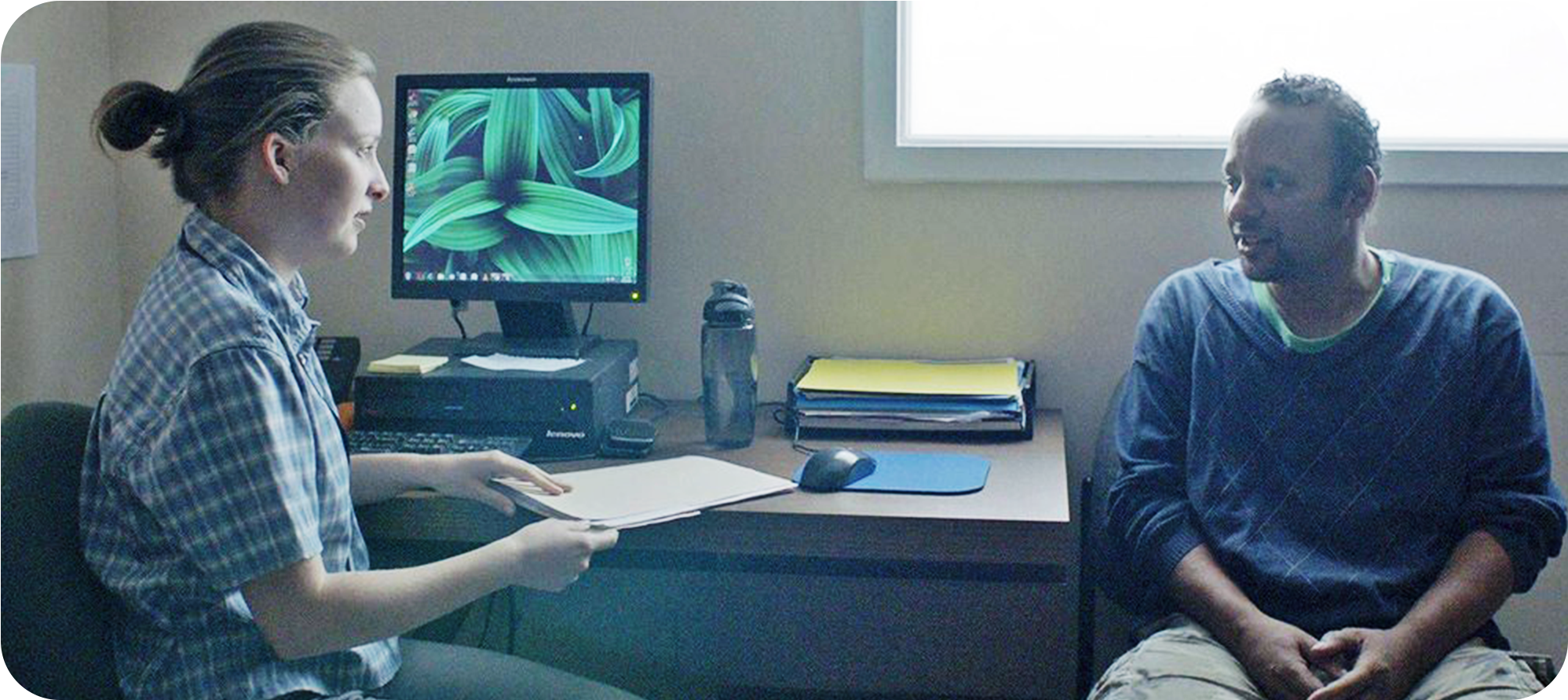by Willa Ross
The camera of Antoine Bourges’s freshman feature Fail to Appear observes offices and coutroom halls and plain-walled living rooms patiently, dispassionately, gently. The person who forms our entry point into this systematized world holds us at arm’s length, just like the film she inhabits. She speaks precisely, in a low, raspy, voice that may be betraying nervousness, or maybe that’s just her timbre. Her job is to keep people from falling through the cracks, and she’s new to it. A coworker tells her, to her shock, that sometimes she will have to juggle as many as 30 concurrent cases, and to her this seems impossible. She's assigned a new case: a sheet of paper describes his history, his issues, and it’s a lot to take in, but some key facts pop out: his name is Eric Edwards (Nathan Roder), and he’s been charged with theft and failure to appear in court. The support caseworker, Isolde (Deragh Campbell), hopes to secure his release in an upcoming court hearing.
At one point, Isolde recounts that she came to social work as a career because of the empathy she felt for literary characters, an experience she hoped she could translate to real people. But she is plainly awkward and uncomfortable in her work, where the people tend to be much more opaque and unflappable than the characters in a novel, and the only “literature” she reads is the hopelessly clinical forms on her desk.
The presentation of these forms shares its aesthetic with intertitles in silent films: the text is presented in flat, head-on close-up, and when it extends past the limits of the frame, it scrolls smoothly upwards. In spite of interrupting visual continuity, intertitles are dialectically suggestive in their juxtaposition of text and image, and by selecting words that complemented their surrounding footage, they bisect cinematic style while the sequence remains whole. Fail to Appear takes full advantage of that. For all its seeming simplicity, this is a work of surprising formal dexterity, and the glimpses of forms, emails, and other documents leverage an epistolary effect to distance us from the people they describe and address, highlighting the contradictions inherent in the cataloguing of an individual person.
These head-on shots contrast strikingly with the rest of the film, which carefully arranges its characters in dynamically composed, lengthy, mostly-static takes so that they are clearly presented to the audience with soft, attractive lighting. The result of that overriding approach is a surprisingly painterly approach to people occupying aggressively sterile spaces of blank walls, browns and beiges. Eventually, Fail to Appear turns this dichotomous approach between procedure and humanity decisively on its head, with the most direct moment of human connection and expression occurring in a climactic shot of a computer screen.
In form and content, Fail to Appear is in many ways a film that complements the Dardennes’ Deux Jours, Une Nuit: that film is an open, overtly emotional expression of an individual’s experience of mental illness, with elaborate camera movement but flamboyant colour direction; Fail to Appear is more subdued in its palette, camerawork, and exposition of character. Both movies have a deceptively unassuming style, and both of them suggest a slightly unreal, allegorical approach to their social contexts — could Isolde plausibly be so quiet and uncommunicative with people, even being so new to her work? — but Fail to Appear’s focus is on the support networks and institutions that operate around (or in spite of) the people they benefit (or don't). Its resultant experience is thus more collective than individual.
Collective, but not impersonal. The film is neatly divided into two halves, respectively dominated by Isolde and Eric, though each person’s presence looms unseen over the other’s story. Bourges crafts an almost effortless sense of suspense throughout; in the first half, he makes Eric an unseen enigma. When Isolde calls Eric’s mother and asks her to appear in court to support her son’s release, the mother sighs, says her son is “an adult now”, and hedges (the moment in court when we realize whether she’s chosen to attend or not is one of the film’s numerous understated but emotional reveals). Later, Isolde carefully withholds from Eric the full nature of her phone conversation with his mother, a moment that once again plays out without underlining its drama, relying on the audience’s attention, the smallest behavioural nuances from the actors, and the exacting mise en scene to draw gravity and tension without breaking from the film’s procedural scheme.
In another sequence, Eric sits down and calmly endures what seems to be a schizophrenic episode, responding to voices that we cannot hear. The moment is unnerving, but soon after we see Eric in moments of quotidian tenderness as he helps his stepfather build furniture, or works on his own music production. It's the sort of unromantic complication that Bourges seems to favour in his study of networks and systems, but it only occasionally peeks through in a more direct gaze on a truly intimate moment.
Fail to Appear is a film of striking bifurcation, but it’s also a cumulative experience that both rewards close attention with revealing details, and forces some speculation and ambiguity in reading its central relationship, or lack thereof. It may be a good sign that I’d say there needs to be more of it, but truthfully the 75-minute runtime doesn't give it much time for that careful accumulation to build up as fully as it could, leaving its last flourish, where plaintive feeling tries to burst through a PC screen’s diodes, somewhat lacking the sense of revelation when it ought to be fully piercing its characters’ guarded exteriors, though its raw conceptual power is undeniable. Nonetheless, this is an intellectually absorbing and sometimes surprisingly moving debut, stunningly confident in the risks it takes, rightly assured in its reasons for taking them, and precisely the sort of new voice in Canadian cinema that ought to be recognized and bolstered.
